MINI SPORE GREATER WANOISTR
Page 54
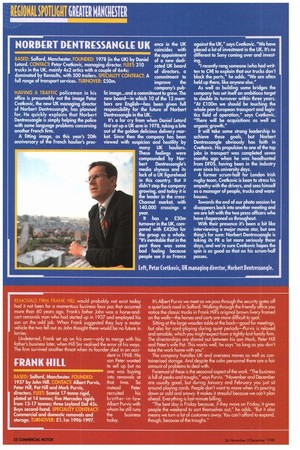
Page 55
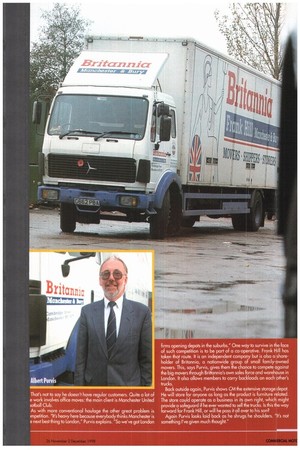
Page 56

Page 57
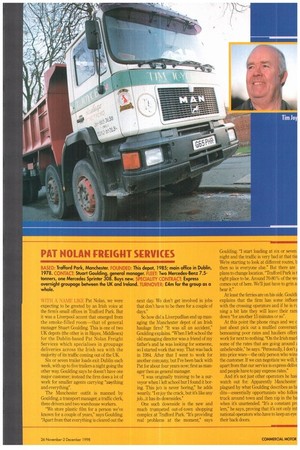
Page 58
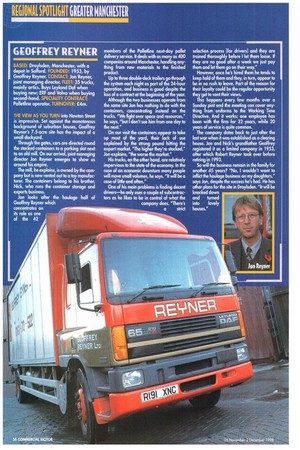
Page 59
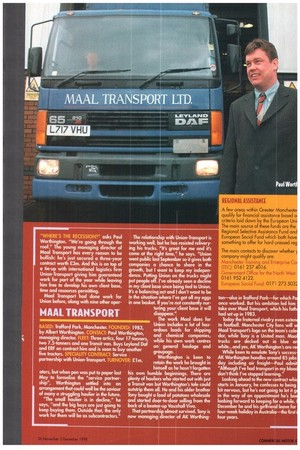
If you've noticed an error in this article please click here to report it so we can fix it.
NORBERT DENTRESSANGLE UK
BASED: Salford, Manchester. FOUNDED: 1978 (in the UK) by Daniel Letard. CONTACT: Petar Cveiicovic, managing director. FLEET: 310 trucks in the UK, mainly 4x2 artics with a couple of 6x45; dominated by Renaults, with 500 trailers. SPECIALITY CONTRACT: A full range of transport services. TURNOVER: £50m.
HAVING A TRAFFIC policeman in his office is presumably not the image Peter Cvetkovic, the new UK managing director of Norbert Dentressangle, has planned for. He quickly explains that Norbert Dentressangle is simply helping the police with some language problems concerning another French firm.
A fitting image, as this year's 20th anniversary of the French haulier's pres ence in the UK coincides with the appointment of a new dedicated UK board of directors, a commitment to
improve the company's public image. ..and a commitment to grow. The new board—in which 10 of the 12 members are English—has been given full responsibility for the future of Norbert Dentressangle in the UK.
It's a far cry from when Daniel Letard first set up a UK arm in 1978, taking a bite out of the golden delicious delivery market. Since then the company has been viewed with suspicion and hostility by many UK hauliers. These feelings were compounded by Norbert Dentressangle's media shyness and its lack of a UK figurehead in this country. But it didn't stop the company growing, and today it is the leader in the crossChannel market, with 140,000 crossings a year.
It has a £50m turnover in the UK, compared with £420m for the group as a whole. "It's inevitable that in the past there was some bad feeling because people see it as France against the UK," says Cvetkovic. "We have placed a lot of investment in the UK. It's no different to Sony coming over and investing.
"I recently rang someone (who had written to CM) to explain that our trucks don't block the ports," he adds. "We are often held up there, like anyone else." As well as building some bridges the company has set itself an ambitious target to double its turnover within three years. "At £100m we should be touching the whole pan-European transport and logistics field of operation," says Cvetkovic. "There will be acquisitions as well as organic growth."
It will take some strong leadership to achieve these goals, but Norbert Dentressangle obviously has faith in Cvetkovic. His propulsion to one of the top jobs in transport was completed seven months ago when he was headhunted from DFDS, having been in the industry ever since his university days.
A former scrum-half for London Irish rugby team, Cvetkovic is keen to stress his empathy with the drivers, and sees himself as a manager of people, trucks and warehouses.
Towards the end of our photo session he disappears back into another meeting and we are left with the two press officers who have chaperoned us throughout.
With their presence it's been a bit like interviewing a major movie star, but one thing's for sure: Norbert Dentressangle is taking its PR a lot more seriously these days, and we're sure Cvetkovic hopes the spin is GS good as that on his scrum-half posses.
Left, Petar Cvetkovic, UK managing director, Norbert Dentressangle.
Albert Purvis
That's not to say he doesn't have regular customers Quite a lot of e work involves office moves: the main client is Manchester United >otball Club.
As with more conventional haulage the other great problem is impetition, "It's heavy here because everybody thinks Manchester is e next best thing to London," Purvis explains. "So we've got London firms opening depots in the suburbs." One way to survive in the face of such competition is to be part of a co-operative. Frank Hill has taken that route. It is an independent company but is also a shareholder of Britannia, a nationwide group of small family-owned movers. This, says Purvis, gives them the chance to compete against the big movers through Brittannia's own sales force and warehouse in London. It also allows members to carry backloads an each other's trucks Back outside again, Purvis shows CM the extensive storage depot. He will store for anyone as long as the product is furniture related. The store could operate as a business in its own right, which might provide a safeguard if he ever wanted to sell the trucks. Is this the way forward for Frank Hill, or will he pass it all aver to his son? Again Purvis looks laid back as he shrugs he shoulders. "It's not something I've given much thought."
T JOYCE ET SONS BASED: Stretford, Manchester. FOUNDED: 1962, by Tim Joyce. CONTACT: Tim Joyce, owner-driver. FLEET: An MAN 30.292 eightlegger. SPECIALITY CONTRACT: Mainly construction work and site clearance. TURNOVER: £110,000 "in a good year".
TIM JOYCE IS WAITING by his truck outside a factory in Stretford. This quiet rood is the truck's place of abode when he's not working and it's a site that works well for Joyce. He's known the guards at the factory for more than 10 years and they keep an eye on it during their night watch.
Originally from Galway, Ireland, Joyce has had mixed fortunes in haulage with his business changing considerably over the years. His first taste of Manchester was in Openshore during the winter of 19621963, having crossed the water to run a 12-tonne tipper previously owned by Norweb.
Half-a-dozen vehicles and 10 years later he came to Stretford, just across the road from his current location in a boatyard called Rathbones. This proved a profitable period with the business expanding to a fleet of five wagons.
That all came to an end, partly due to the sale of the yard for development. Joyce found himself in Trafford Park before it grew into the haulage centre it is today.
The story turned full circle when he moved back to his present location around 10 years ago and renewed the contacts he had made with the factory workers during his time at the boatyard.
Joyce's main contract these days is tipping work and clearance for Direct Works. Jobs often revolve around house maintenance as well as the building of new properties.
His work is closely linked to the construction industry, making it vulnerable to the recession. "I'm finding it tough at the moment," he admits. "I've done nothing this week and it's Wednesday. "The last recession was a struggle but there were a few days that were good. I find if you get a good summer it's not too bad. It's a case of staying afloat. The rest of the family has left home and my wife works. In general if you have six or seven good months you can get over the bad ones."
On the subject of family, the name T Joyce and Sons is a bit of a misnomer. "It's only there to make it sound better," says Joyce. "I tried to get my two daughters and two sons interested but they've seen me struggling over the years." When Joyce talks of struggling he speaks with authority. Even his best years, overseeing the five wagons at Rathbones boatyard, turned sour. Often working on vehicles through the night, he fell foul of a severe bout of arthritis that put him in a wheelchair and off the road for four months.
But he returned to haulage and remained optimistic: "It has its bad points but it has its good points too. You've got to have a fighting spirit to see you through," he says, in what could be the understatement of the year.
These days, apart from the lack of work, he has to contend with the nationwide problem of unlicensed agricultural and construction vehicle operators working as hauliers, and being undercut by operators who register their trucks under private tax rates.
As we leave Tim Joyce we ask him if he'll be on his mobile in case we have any further questions. "I'm always on my mobile," he replies, "particularly if you've got some work for me!"
PAT NOLAN FREIGHT SERVICES
BASED: Trafford Park, Manchester. FOUNDED: This depot, 1985; main office in Dublin, 1978. CONTACT: Stuart Goulding, general manager. FLEET: Two Mercedes-Benz 7.5tonners, one Mercedes Sprinter 308. Buys new. SPECIALITY CONTRACT: Express overnight groupage between the UK and ireland. TURNOVER: Um for the group as a whole.
I 1ME LIKE Pat Nolan, we were expecting to be greeted by an Irish voice at the firm's small offices in Trafford Park. But it was a Liverpool accent that emerged from the smoke-filled room—that of general manager Stuart Goulding. This is one of two UK depots (the other is in Hayes, Middlesex) for the Dublin-based Pat Nolan Freight Services which specialises in groupage deliveries across the Irish sea with the majority of its traffic coming out of the UK.
Six or seven trailer loads exit Dublin each week, with up to five trailers a night going the other way. Goulding says he doesn't have one major customer; instead the firm does a lot of work for smaller agents carrying "anything and everything".
The Manchester outfit is manned by Goulding, a transport manager, a traffic clerk, three drivers and two warehouse workers.
"We store plastic film for a person we've known for a couple of years," says Goulding. "Apart from that everything is cleared out the next day. We don't get involved in jobs that don't have to be there for a couple of days."
So how did a Liverpudlian end up managing the Manchester depot of an Irish haulage firm? "It was all an accident," Goulding explains. "When I left school the old managing director was a friend of my father's and he was looking for someone, so I started work that way. That was back in 1984. After that I went to work for another company, but I've been back with Pat for about four years now; first as manager then as general manager.
"I was originally training to be a surveyor when Heft school but I found it boring. This job is never boring," he adds wearily. "I erjoy the crack, but it's like any job...it has its downsides."
One such downside is the new and much trumpeted out-of-town shopping complex at Trafford Park. "It's providing real problems at the moment," says Goulding. "I start loading at six or seven night and the traffic is very bad at that tin We're starting to look at different routes, t then so is everyone else." But there are plans to change location. "Trafford Park is t right place to be. Around 70-80% of the wc comes out of here. We'll just have to grin a bear it."
At least the ferries are on his side. Gouldi explains that the firm has some influer with the crossing operators and if he is rt ning a bit late they will leave their ram down "for another 15 minutes or so".
At this point the phone rings and we c just about pick out a muffled conversati bemoaning poor rates and hauliers offeri work for next to nothing. "On the Irish marl some of the rates that are going around unbelievable," he says. "Personally, I don't into price wars—the only person who wim the customer. If we can negotiate we will, t apart from that our service is express deliv< and people have to pay express rates."
And it's not just other operators he has watch out for. Apparently Manchester plagued by what Goulding describes as in dits—essentially opportunists who follov truck around town and then nip in the ba when it's unattended. "It's a constant pr( lem," he says, proving that it's not only int national operators who have to keep an eye their back doors.
GEOFFREY REIMER
BASED: Droylsden, Manchester, with a depot in Salford. FOUNDED: 1953, by Geoffrey Reyner. CONTACT: Jon Reyner, joint managing director. FLEET35 trucks, mainly artics. Buys Leyland Daf when buying new; ERF and Volvo when buying second-hand. SPECIALITY CONTRACT: PaUdine operator. TURNOVER: Um.
THE VIEW AS YOU TURN into Newton Street is impressive. Set against the monotonous background of suburban houses, Geoffrey Reyner's 7.5-acre site has the impact of a small dockyard.
Through the gates, cars are directed round the stacked containers to a parking slot next to an old mill. On our arrival, joint managing director Jon Reyner emerges to show us around his empire.
The mill, he explains, is owned by the company but is now rented out to a toy manufacturer. The containers belong to his brother, Nick, who runs the container storage and exports business.
Jon looks after the haulage half of Geoffrey Reyner which concentrates on its role as one of the 42 members of the Palletline next-day pallet delivery service. It deals with as many as 400 companies around Manchester, handling anything from raw materials to the finished product.
Up to three double-deck trailers go through the system each night as part of the 24-hour operation, and business is good despite the loss of a contract at the beginning of the year. Although the two businesses operate from the some site Jon has nothing to do with the containers, concenh-ating instead on the trucks. "We fight over space and resources," he says, "but I don't see him from one day to the next."
On our visit the containers appear to take up most of the yard, their lack of use explained by the strong pound hieing the export market. "The higher they're stacked," Jon explains, "the worse the market."
His trucks, on the other hand, are relatively impervious to the state of the economy. In the case of an economic downturn many people will move small volumes, he says. "It will be a case of little and often."
One of his main problems is finding decent drivers—he only uses a couple of subcontractors as he likes to be in control of what the company does. "There's a strict selection process [for drivers] and they are trained thoroughly before I let them loose. If they are no good after a week we just pay them and let them go on their way."
However, once he's hired them he tends to keep hold of them and they, in turn, appear to be in no rush to leave. Part of the reason for their loyalty could be the regular opportunity they get to vent their views.
This happens every few months over a Sunday pint and the meeting can cover anything from uniforms to the Working Time Directive. And it works: one employee has been with the firm for 32 years, while 20 years of service is quite common.
The company dates back to just after the last war when it was established as a clearing house. Jon and Nick's grandfather Geoffrey registered it as a limited company in 1953, after which Robert Reyner took over before retiring in 1993. So will the business remain in the family for another 45 years? "No, I wouldn't want to inflict the haulage business on my daughters," says Jon, despite the success he's had. He has other plans for the site in Droylsden. "It will be knocked down and turned into lovely houses."
MAAL TRANSPORT
BASED. Trafford Park, Manchester. FOUNDED: 1983, by Albert Worthington. CONTACT: Paul Worthington, managing director. FLEET: Three artics, four 17-tonners, two 7.5-tonners and one Transit van. Buys Leyland Daf and ERF on contract hire and is soon to buy another five tractors. SPECIALITY CONTRACT: Service partnership with Union-Transport. TURNOVER: £lm.
"WHERE'S THE RECESSION?" asks Paul Worthington. "We're going through the roof." The young managing director of Maul Transport has every reason to be bullish: he's just secured a three-year contract worth Om. And this is on top of a tie-up with international logistics firm Union-Transport giving him guaranteed work for part of the year while leaving him free to develop his own client base, time and resources permitting. Maul Transport had done work for Union before, along with nine other oper ators, but when pen was put to paper last May to formalise the "service partnership", Worthington settled into an arrangement that could well be the saviour of many a struggling haulier in the future. "The small haulier is in decline," he says, "and the big boys are just going to keep buying them. Outside that, the only work for them will be as subcontractors." The relationship with Union-Transport is working well, but he has resisted reliverying his trucks. "It's great for me and it's come at the right time," he says. "Union went public last September so it gives both companies a chance to share in the growth, but I want to keep my independence. Putting Union on the trucks might put people off. I've already seen a decline in my client base since being tied to Union. It's a balancing act and I don't want to be in the situation where I've got all my eggs in one basket. I you're not constantly nurtu ng your client base it will di ppea The work Maul does for Union includes a lot of hazardous loads for shipping and chemical companies, while his own work centres on general haulage and groupage. Worthington is keen to retain the work he brought in himself as he hasn't forgotten his own humble beginnings. There are plenty of hauliers who started out with just a Transit van but Worthington's tale could outstrip them all. He and his older brother Tony bought a load of potatoes wholesale and started door-to-door selling from the back of a beaten-up Vauxhall Viva. That partnership almost survived. Tony is now managing director of AK Worthing ton—also in Trafford Park—for which P once worked. But his ambition led him take over Maul Transport, which his fa had set up in 1983.
Today the fraternal rivalry even exten to football. Manchester City fans will s Maul Transport's logo on the team's cal dar, while Tony is a United man. Ma trucks are decked out in blue a white.. and yes, AK Worthington's are r While keen to emulate Tony's success AK Worthington handles around 85 job day including air freight—Paul admi "Although I've had transport in my bloo don't think I've stopped learning."
Looking ahead to the new contract whi starts in January, he confesses to bein bit nervous, but he's not going to let it in the way of an appointment he's be looking forward to keeping for a while. December he and his girlfriend leave fo four-week holiday in Australia—the first four years.
REGIONAL ASSISTANCE A few areas within Greater Manchester qualify For financial assistance based cy criteria laid down by the European Uni The main source of these funds are the Regional Selective Assistance Fund and European Social Fund which both hove something to offer for hard-pressed reg The main contacts to discover whether company might qualify are: Manchester Training and Enterprise Co (TEC): 0161 237 4016.
Government Office for the North West: 0161 952 4122.
European Social Fund: 0171 273 503:




















































































































